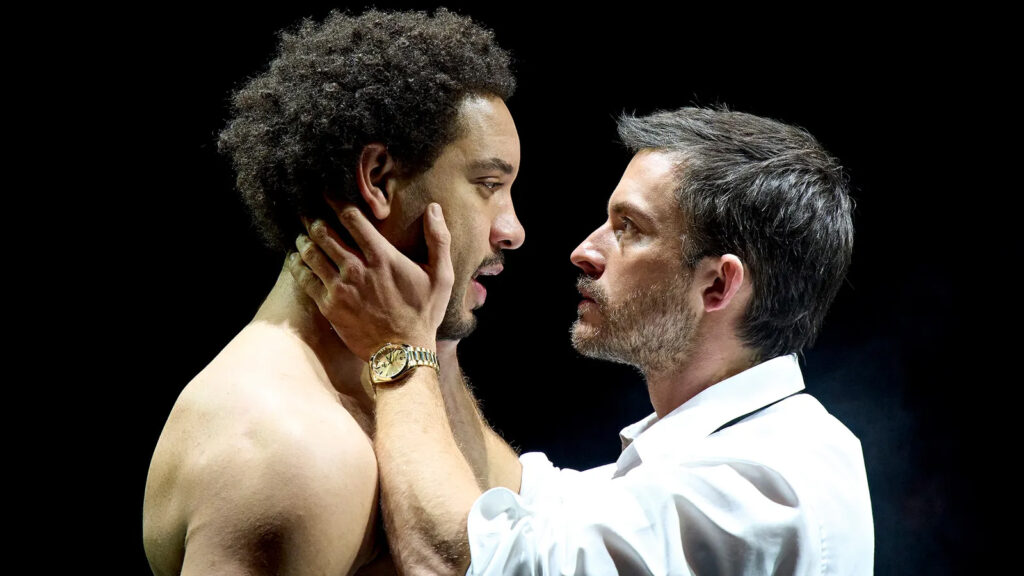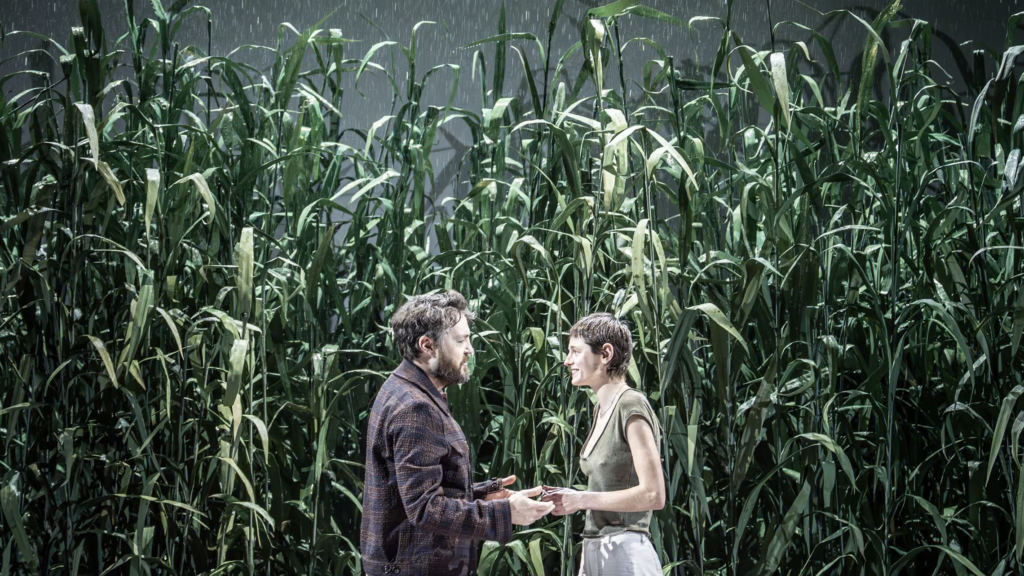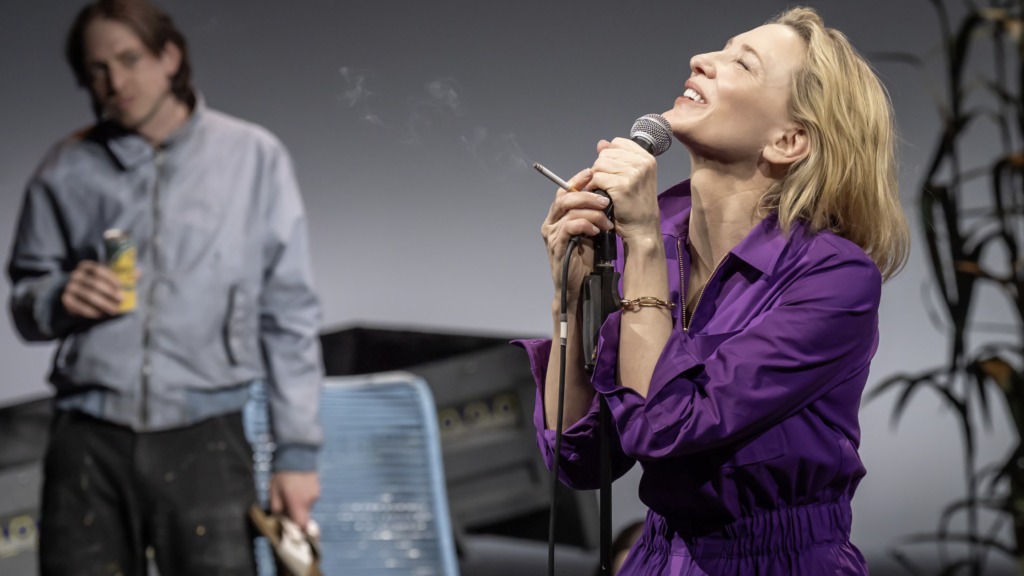
Manuel Harlan
“People over forty should give up directing,” Thomas Ostermeier once declared. The German director is no stranger to provocation, having first made his name with the radically gritty naturalism of the likes of Mark Ravenhill and Sarah Kane and achieving international notoriety with his reinterpretations of Ibsen and Shakespeare. He can surely relate, then, to Chekhov’s hapless Konstantin, who rails against the bourgeois complacency of theatre.
One can only imagine what Konstantin would have said about the glut of celebrity-led vehicles: this Broadway season features everyone from George Clooney to nearly the entire cast of Succession, and on a recent trip to London I saw Cate Blanchett in Ostermeier’s own Seagull and Jonathan Bailey in Richard II. One can at least partially blame British director Jamie Lloyd for this phenomenon, who has seemingly found the recipe for financial success on both sides of the pond by combining celebrity casting with blandly minimalist sets – a sort of Ivo van Hove without the Belgian director’s insight or creativity.
The same fate seems to have befallen the once-great Nicholas Hytner, best known to opera fans for his classic ENO Xerxes and Magic Flute as well as his brilliantly insightful Glyndebourne Cosi. After over a decade at the helm of the National Theatre, Hytner founded the London Theatre Company at the new Bridge Theatre where he directed a joyous Midsummer Night’s Dream and a radical, immersive Guys and Dolls. His Richard II, though, is perfunctory at best, with none of the creativity of his older productions. It has the glossy superficiality of a television corporate drama, heightened by the generic background music that accompanies each scene change.
Richard II is one of Shakespeare’s most lyrical plays, and Jonathan Bailey brings an innate mellifluousness to the text. He’s charismatic as the titular monarch, whether whimsically eating grapes on his uncle’s deathbed or in explosive rage as his kingdom is taken away from him. He’s at his best, though, in quieter moments, bringing a hushed musicality to his “hollow crown” soliloquy. One of Hytner’s biggest directorial missteps interrupts the intimacy of Richard’s prison scene with an inexplicably action movie-esque death scene.
But as beautiful as Richard’s soliloquies may be, the action falls flat if he has nobody to play against. Richard’s downfall allows the ascendancy of Bolingbroke’s Henry IV, and Royce Pierreson’s muscular Bolingbroke gives little insight into the character’s Machiavellian workings. Bailey is majestic in their central confrontation, appearing on the balcony in full Jesus garb while Pierreson’s Bolingbroke points an artillery gun from the stage, but it feels one-sided. Clive Wood’s John of Gaunt gets the famous “sceptered isle” soliloquy which he dispatches beautifully, but otherwise Hytner does little to distinguish the motivations of the various dukes, lords, and earls to abandon Richard for Bolingbroke. Olivia Popica fares the worst as Richard’s hapless queen, with nothing to do but sit amongst her shopping bags. The only jolt of energy comes from Amanda Root’s Duchess of York, who is electrifying in her short time onstage.
But no matter: tickets are selling well, no doubt because Jonathan Bailey is a star and a good-looking one at that. There’s no doubting that Bailey is an excellent Richard II, easily standing in comparison with David Tennant, Fiona Shaw, and other Richards in recent history, but his performance would have been that much more satisfying in the context of a thoughtful production.

Marc Brenner
I was equally cynical going into Ostermeier’s Seagull (“starring Cate Blanchett, and Emma Corrin from The Crown!”, proclaimed the ads) but I needn’t have worried. Ostermeier’s usual loud tricks are still there – Zachary Hart’s Medvedenko pulls out an electric guitar and sings Billy Bragg, and Cate Blanchett’s Arkadina leads the audience in a rousing singalong of “Que sera, sera”. But otherwise he plays Chekhov relatively straight, and homes in on the dysfunctionality of each character with equally unrelenting focus.
Blanchett has a blast with Arkadina’s diva antics, with impeccable comic timing and tightly-wound physicality, at one point tap dancing into the splits. There’s a self-awareness to her portrayal, making her first appearance in proper diva sunglasses which she reluctantly takes off to put on the virtual reality glasses for Kontantin’s play. She channels Gwyneth Paltrow on trial, cooing about cold plunges in Ostermeier and Duncan Macmillan’s updated text. Her big scene with Trigonin makes it clear that all of her relationships are dysfunctional because she is constantly playing to an audience, but you realize that the exaggerated archness of this portrayal is itself part of the character and as the evening goes on her antics make way for a chilling stillness. Her expression at the final curtain is unforgettable, in the manner of Isabelle Huppert at the end ofThe Piano Teacher.

Marc Brenner
Ostermeier succeeds where Hytner does not by keeping the focus firmly on the ensemble rather than the star. Blanchett’s best moments are opposite Tom Burke’s inward Trigonin, whose shuffling awkwardness is endearing at first but reveals him a grasping narcissist, as well as with Jason Watkins’s Simon. Watkins is utterly devastating in the final Act, a harrowing portrayal of dementia, and he draws equally fine performances from the rest of the cast in a rare moment of tenderness in which their characters aren’t completely self-absorbed. There are fine performances too from Paul Higgins, Priyanga Burford, and Paul Bazely as Shamrayev, Polina, and Dorn, and a wonderfully cynical Tanya Reynolds as Masha.
Pointed character sketches aside (and I include Arkadina in this category), Ostermeier rightfully puts the focus on Konstantin and Nina and their coping mechanisms for dealing with change. Kodi Smit-McPhee’s lanky Konstantin is charmingly petulant, but he (or his character) fails to develop much over the course of the evening. Meanwhile, Emma Corrin’s Nina is the wonder of the production, an effective counter to the usual ingenue. This Nina is an open book, earnest and prickly in equal measure, with a street-smart edge that makes the character’s vulnerabilities all the more moving. Corrin is particularly moving in their final monologue, twitching with nervous energy. There isn’t any transcendence here, only defeat.
At its heart, Ostermeier’s Seagull plays it relatively safe, and those hoping for something more radical from the once-iconoclastic director may come away disappointed. Yet when you take away the shock value Ostermeier reveals himself as someone who is able to draw compellingly nuanced performances from his stars, and perhaps that’s what theatre is all about.


